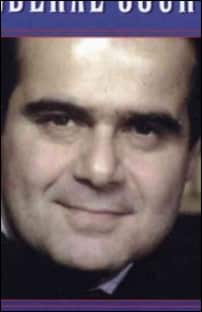Liberty or inflexibility: reading Antonin Scalia
By Kristopher A. Nelson
in
October 2011
500 words / 2 min.
Tweet
Share
Antonin Scalia, Supreme Court justice and originalist extraordinaire, wrote “Common-Law Courts in a Civil Law System” as a part of A Matter of Interpretation: Federal Courts and the Law. In it explains his approach to legal reasoning and especially to Constitutional interpretation, and especially rejects both legislative history and the so-called “living Constitution” of liberal justices like Stephen Breyer.

Please note that this post is from 2011. Evaluate with care and in light of later events.
Antonin Scalia, Supreme Court justice and originalist extraordinaire, wrote “Common-Law Courts in a Civil Law System” as a part of A Matter of Interpretation: Federal Courts and the Law (The University Center for Human Values Series).
In it he explains his approach to legal reasoning and to constitutional interpretation, rejecting both legislative history and the so-called “living Constitution” of liberal justices like Stephen Breyer.
One particular point struck me as I read through Scalia’s article: for him, focus appears to be on the freedom of government to do what it wishes, not on what is typically called the “civil liberties” of individuals. Scalia writes:
Historically, and particularly in the past thirty-five years, the “evolving” Constitution has imposed a vast array of new constraints–new inflexibilities–upon administrative, judicial, and legislative action.
Thus, for example, the exclusionary rule — which forbids the “admitting in a state criminal trial evidence of guilt that was obtained by unlawful search” is not about increasing nor protecting individual liberties, but rather about decreasing the freedom of “democratic government.” Similarly, “imposing property requirements as a condition of voting” could once “be done or not done, as the society desired” is a problem because it removes rights from government, rather than a good thing because it increases the rights of individuals.
And the future agenda of constitutional evolutionists is mostly more of the same–the creation of new restrictions upon democratic government, rather than the limitation of old ones. Less flexibility in government, not more. … [G]enerally speaking, devotees of The Living Constitution do not seek to facilitate social change but to prevent it.
He acknowledges that this isn’t always the case, but then says that
those exceptions only serve to refute another argument of the proponents of an evolving Constitution, that evolution will always be in the direction of greater personal liberty.
Suddenly, and remarkably, Scalia has made the leap to connect “personal liberty” with the freedom of government to make laws. He then continues this with a discussion of his favorite personal liberties: property rights and guns. This is the argument I expected to see from him, and is a traditional (and important) dispute over which liberties are more important. But Scalia here presents them as an extension of decreasing the liberty of the government to make laws.
It’s a fascinating rhetorical move, and is perhaps even more important as a fundamental distinction that tells us something more about likely outcomes than debates about “originalism” or “textualism” do.
